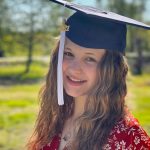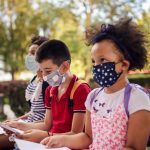“Learning is never lost, though it may not always be ‘found’ on pre-written tests of pre-specified knowledge or preexisting measures of pre-coronavirus notions of achievement.” – Rachael Gabriel, Associate Professor of Literacy Education at the University of Connecticut.
Throughout my teacher preparation program at UConn’s Neag School of Education, I always knew that my first year of teaching would be challenging. However, I never could have imagined the challenges that the year 2020-2021 has brought. This year has brought students in masks with shields over their desks, hybrid learning, block schedules, fully online students, and the struggle to keep students engaged despite the uncertainty of their outside world. All of the teaching and classroom management strategies that I learned in my teacher preparation program now seemed distant as all teachers learned how to adapt and teach in this new learning model.
Creative activities served as a buffer that helped many older adults cope with isolation, stress and fear during the pandemic, according to James C. Kaufman of the Neag School of Education at the University of Connecticut, Storrs. He points to research that suggests that participation in arts—crafts as well as dance, singing or painting—helps increase social engagement, stave off depression and keep older adults mentally engaged and active.
Virtual classrooms may become a permanent fixture in the state of Connecticut. New legislation tasks the state’s Department of Education to develop plans for a K-12 statewide remote learning school that would use the same curriculum and have the same school year length as a traditional school, but would be under the jurisdiction of the State Board of Education.
It was coming home,” U.S. Secretary of Education Miguel Cardona ’01 MA, ’04 6th Year, ’11 Ed.D., ’12 ELP said of heading to Pratt & Whitney Stadium at Rentschler Field to give this year’s commencement address. Students could not have agreed more. At a string of outdoor ceremonies May 8–12, students and families gathered together for the first time in many long pandemic months.
Dr. Violet Jiménez Sims, the associate director of teacher education at Neag, said that education students could meet some of the demand for teachers. Her five-year program partners with 13 districts in the state, and she said that many of these districts hire their graduates. Dr. Niralee Patel-Lye, who directs Neag’s accelerated teacher certification program, said the department recently piloted a program that places students in full-time teaching positions.
Summer school programs help children get better at both reading and mathematics. Students who attend summer school tend to have higher test scores than those who don’t, which means that offering voluntary summer programs is likely to help students catch up from pandemic-related learning slowdowns. And summer learning programs may also improve outcomes beyond test scores, such as by helping students to recover course credits.
“Summer school programs help children get better at both reading and mathematics. Students who attend summer school tend to have higher test scores than those who don’t, which means that offering voluntary summer programs is likely to help students catch up from pandemic-related learning slowdowns,” says Kathleen Lynch, an assistant professor of learning sciences at UConn’s Neag School of Education.
“The visits to UConn are really important to the students taking UConn classes for credit in high school,” says Brendan Wilkosz ’03 (ED), ’04 M.Ed., who has been at Berlin HS since 2004, and teaches a chemistry class that grants UConn credit through the ECE program. “There can be a disconnect for the students if they are physically separated from UConn. This year, that was not possible, but it was important for me to do something, so we worked on a virtual day. There was a real willingness at UConn to get that done to have students experience the challenges and complexities of the work, but also see that the research is cutting edge.”
Sarah Woulfin, an associate professor at UConn’s Neag School of Education, said she prioritized students’ humanity during the pandemic, which she hopes will continue. “I am somewhat optimistic that this will stay in a certain way and perhaps in certain pockets,” she said.


